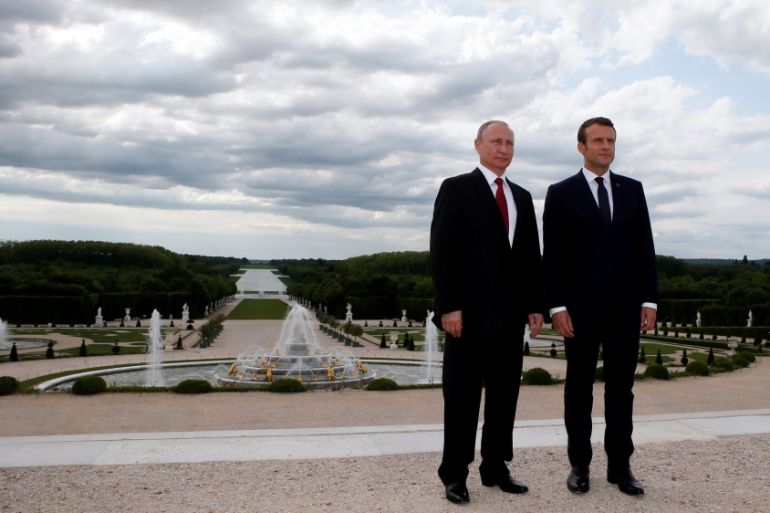Muammar Putin at the Versailles
Gaddafi’s shadow loomed at Versailles during Macron’s meeting with Putin.

On Monday, newly elected French President Emmanuel Macron hosted his Russian counterpart Vladimir Putin at the Palace of Versailles.
Perhaps trying to add an air of importance to Putin’s visit, Russian TV channel RT shared the following curious detail: “Receptions in Versailles are very rare. For example, Nicolas Sarkozy received a guest at the royal palace only once. That was the famous visit of Muammar Gaddafi in 2007.”
Keep reading
list of 4 itemsGabriel Attal becomes France’s youngest prime minister
Macron says protecting civilians ‘non-negotiable’ at Gaza aid conference
Macron visits Kazakhstan on strategic tour of Central Asia
Whether it was just a coincidence or smart political trolling, Macron’s decision to meet with Putin in Versailles is indeed important, at the very least it provides for a pertinent analogy to be drawn.
|
|
A dictator from an oil-producing nation falls out with the West after a passenger airliner is taken down. As a result, he faces international sanctions, starts experiencing economic problems, and heightens anti-Western propaganda. Both Putin and Gaddafi walked that path. In Gaddafi’s case, we know the end of the story, in Putin’s case – we don’t yet.
Gaddafi accepted responsibility for the Lockerbie tragedy and managed to get the sanctions revoked. He made a few more concessions to the West, including giving up Libya’s nuclear programme. Of course, after the beginning of the civil war, the meeting in Versailles did not prevent Sarkozy from becoming a main ally of the Libyan rebels, while the French air force played a key role in Gaddafi’s downfall.
For Putin, that moment was painful. At the time, Dmitry Medvedev was formally the president of Russia, but Putin made a power play when he publicly criticised a UN Security Council vote on Libya in 2011. Medvedev had given orders for Russia to abstain on the vote, and it did, but this public sparring over the issue was significant. It is possible that this was one of the main factors that pushed Putin to announce a few months later that he would undo his “castling” move and run for president again.
OPINION: Macron, Putin and the boomerang effect
Today, it is clear that Putin’s interpretation of events in Libya goes something like this: Gaddafi showed weakness by conceding to the West, which took advantage of that and, under the pretext of protecting civilians, overthrew him. This is generally how Russian state media presents the Libyan case.
|
|
It makes sense then that Putin would never consider making any concessions to the West. But Monday’s meeting in Versailles seemed like one: It looked like an unsuccessful attempt of the prodigal son to return to the international community. Putin’s visit was scheduled after his phone call with Macron to congratulate him on his victory, which suggests that it was a Kremlin initiative.
At the joint press conference, a reporter for the RT channel reminded the French president that during the electoral race, his campaign headquarters did not accredit RT and asked how he intends to build relations with foreign journalists. Macron did not even try to be diplomatic in his answer:
“I have always had an exemplary relationship with foreign journalists, but they have to be journalists. […] When organs of the press spread shameful untruths, they are no longer journalists, they are organs of influence. Russia Today and Sputnik were organs of influence during this campaign and have, on several occasions, produced untruths about me and my campaign. And I considered that they had no place in my headquarters. All foreign journalists, including Russian ones, had access to my campaign.”
OPINION: Russia’s soft warfare
This is a concise retelling of what Macron actually said. He repeated himself, and it was clear he was trying to control his anger. It was also clear that Putin – pursing his lips and fidgeting – was listening to something rather unpleasant.
Putin likely misinterpreted Macron's decision to accept the visit as an opportunity to restart relations. But it seems that the French president's intent was rather to show that he is not letting personal affront influence his political decisions and diplomacy.
In other words, it doesn’t seem that Putin met a friend in Paris – as was the case with Jacques Chirac. He wasn’t even meeting a partner, which is what Sarkozy was, to some extent. Macron was harder on Putin than Francois Hollande was, Hollande supported the sanctions but would hardly have allowed himself such candour in Putin’s presence.
Of course, Hollande did not face attacks by Russian hackers or a massive media campaign aimed at discrediting him, and the Kremlin did not openly support his political opponents.
As Belgian blogger Nicolas Vanderbiest has established, internet trolls spreading fake news about Macron were linked to RT and Sputnik. There were also clear Russian traces in the metadata of the leaked campaign emails.
Putin likely misinterpreted Macron’s decision to accept the visit as an opportunity to restart relations. But it seems that the French president’s intent was rather to show that he is not letting personal affront influence his political decisions and diplomacy.
After the uncomfortable visit to Paris, things are not looking good for Putin. It seems that he will be similarly disappointed in the US, where talk of impeachment is making any rapprochement with Russia impossible. Even his meeting with Donald Trump may not happen after all.
We should not forget that Russia has also faced a new wave of protests, which the authorities have suppressed with unprecedented severity. Of course, we cannot talk about a civil war, but in this pre-election year, tensions will inevitably rise. And then the Libyan analogy might resurface yet again in a different light.
Roman Dobrokhotov is a Moscow-based journalist and civil activist. He is the editor-in-chief of The Insider.
The views expressed in this article are the author’s own and do not necessarily reflect Al Jazeera’s editorial policy.
